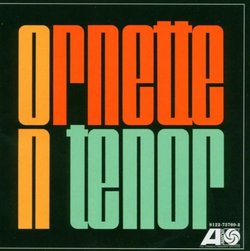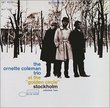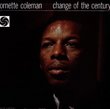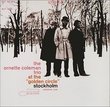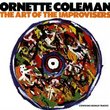| All Artists: Ornette Coleman Title: Ornette on Tenor Members Wishing: 0 Total Copies: 0 Label: Rhino/Wea UK Release Date: 1/13/2008 Album Type: Import Genres: Jazz, Pop Style: Avant Garde & Free Jazz Number of Discs: 1 SwapaCD Credits: 1 UPC: 081227376024 |
Search - Ornette Coleman :: Ornette on Tenor
CD DetailsSimilar CDs
|
CD ReviewsDoesn't quite come together as nicely as you'd like. Michael Stack | North Chelmsford, MA USA | 09/01/2005 (2 out of 5 stars) "The last studio album Ornette coleman would record for Atlantic, "Ornette on Tenor" is unique in many ways, not the least of which is the feature of the leader on the tenor saxophone rather than the alto. In addition, replacing Scott LaFaro (who died before this album was recorded) is the not-yet legendary soon-to-be bassist for John Coltrane, Jimmy Garrison, joining trumpeter Don Cherry and drummer Ed Blackwell. The results of the session are a bit mixed-- for some reason, I always have fond memories of this record, but listening to it, I always find it somewhat less rewarding than my memories recall. Largely, I suspect this is because of Garrison-- for someone who a few years later would be one of the most adventerous and exciting bassists on the planet, he is tentative on this recording-- his playing throughout shows he's not really embracing the music of Ornette Coleman. The rest of the band, however, performs admirably. With Coleman taking extended solos on tenor, Cherry assumes a much more aggressive stance than usual and seems concerned with filling his space more effectively. The result is both horns sounding drastically different than usual. The definite highlight is opener "Cross Breeding"-- even with Garrison's tentativeness, the catchy start-stop riff bleeds into a partially unaccompanied solo by Coleman full of grunts and growls before being joined by the rhythm section and switching to his more linear lines. Underneath Cherry's solo, Garrison finally "gets it" (this is a common thread-- he seems more comfortable playing under Cherry) and the whole thing comes together. But the unusual instrument led to some odd experimentation that is less than successful-- "Mapa" feels uneven in its delivery and the "Ornette" sound is totally absent, and while "Enfant" feels more like a Coleman piece, it just lacks any particular energy to it. Admittedly, my two star rating is a bit harsh, but the Atlantic recordings are of such high quality, I have a tendency to look at it relative to those. Newcomers should start with the superlative "The Shape of Jazz to Come", converted may want to check this one out, it's a decent listen, just not as good as his other Atlantic work." Pure unadulterated BRILLIANCE kaysixone | Manchester, UK | 07/03/2003 (5 out of 5 stars) "Ornette Coleman is undoubtedly one of the greatest and most influential musicians of the last century - but like many true originals he had to endure a great deal of hostility when he first appeared on the scene in the late 1950s from those who either resented, didn't understand or just didn't like the way he chose to ignore rules which they considered fundamental to jazz (and which many established musicians had devoted countless hours of practice to learning).... Coleman's musical vision (which came to be known as harmolodics) defies easy categorisation and his own attempts to explain it have been frustratingly vague. Basically he wanted to free his playing from the restrictions of harmonic and rhythmic conventions prevalent in the jazz of the 1950s - and crucially, to create improvisations using the melodic line as a starting point which were not dependent on chord changes. Although his name will always be associated with "free jazz", Coleman's music is far from "free" and contains an abundance of logic, melody and rhythm, as well as being deeply rooted in the blues. Despite causing so many waves among the jazz establishment (or maybe because of it) Coleman also managed to attract a hardcore of devotees and win the support of other young musicians looking for new ideas and fresh approaches to playing (Don Cherry, Charlie Haden, Scott La Faro, Billy Higgins, Ed Blackwell and others). The core of his most influential output was recorded during numerous sessions for the Atlantic label between 1959 and 1961, including groundbreaking albums like "The shape of jazz to come", "Change of the century", "This is our music", "Free jazz" etc.... The complete recordings can be found in chronological order on the 6 cd set "Beauty is a rare thing", but if your budget doesn't stretch that far, "Ornette on tenor" from 1961 is as good an example as any of Coleman's music from this period. Although he usually plays alto sax, Coleman switched to the tenor for this album because in his opinion "the best statements Negroes have made of what their soul is have been on tenor saxophone".... Like nearly all the Atlantic sessions, it's a quartet recording and features sublime performances from the leader with great support from Don Cherry on trumpet, Jimmy Garrison on bass and Ed Blackwell on drums. With no piano in the line-up (the omission of which was still pretty revolutionary in those days) Garrison and Blackwell's role is as much melodic and interactive as it is rhythmic - and their choice of phrases sometimes suggest new directions for Coleman and Cherry, who both play with incredible fluency and almost telepathic understanding. Coleman's expressive solos make full use of the tenor's deeper range, while Cherry's contributions are generally more subtle (particularly on the awesome "Cross breeding", when after the leader's stunning solo there's not much left to say). There seems to be an endless amount of space in this music - so many melodic possibilities for the players to explore and four decades on it still sounds remarkably fresh and contemporary. Not just great jazz but great music, period. Free your mind...." Gutty Evan Chandlee | Paris, France | 11/26/2007 (5 out of 5 stars) "Although Jimmy Garrison finally broke with Ornette, he was an remarkably appropriate bass player for this, the tenor session. On cuts such as Eos and Enfant, Garrison's mainly lower register work with frequent vamps and pedal points provides an elastic underpinning that drives every tune and solo. His profound & incredibly elastic groove, adventurous but always melodic and irresistibly "straight ahead", was just what Ornette needed to give the tenor 4tet a different sound. Blackwell also contributes to the depth of the 4tet sound by playing as much on the skins as on the cymbals, never far from the snare & toms, maintaining a swinging yet ever changing groove across the entire set. On Ecars the group is really singing. Ornette is as inspired, earthy and lyrical on cuts such as Cross Breeding and Enfant - check his leap out of the short tune on the latter- as he ever has been on alto. Thanks in great part to the Garrison-Blackwell empathy, the groove is innovative, daring even, as each 4 and 8 measure segment unfolds, yet is always precise, cohesive & exciting."
|

